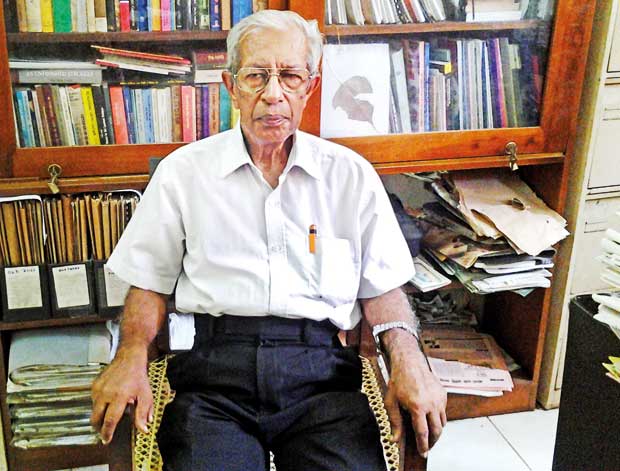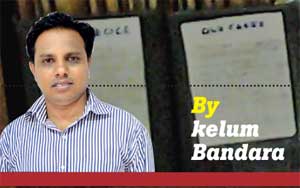07 Jul 2017 - {{hitsCtrl.values.hits}}

In the Constitutional Council, there are three civil society representatives. All are pro-United National Party (UNP) people. Other seven are all government members. Whether they were appointed by one individual or party doesn’t make a difference. Ultimately the party in power can control the whole thing. I don’t think any of these commissions are independent. Though there are ten members in the Constitutional Council, five of them can sit together and decide on the selection of members to the independent commissions. One is the Prime Minister and the other is the Leader of the Opposition. The Opposition Leader was appointed without the support of MPs . He has no right to be the Opposition Leader. These two get together and decide on everything. I don’t think there is any democracy here.
"The Cabinet ceases to function in the case of dissolution of Parliament or else in the defeat of a no confidence motion against the government"
 government and the other sitting in the opposition, won’t it be a better system?
government and the other sitting in the opposition, won’t it be a better system?Then, it will be more democratic. That hasn’t been allowed to happen. I want to emphasize that there is no point in appointing anyone to independent commissions unless he or she has courage to stand up for justice. You seldom find such people. We need people who have the courage to stand up rather than carry out unfair or illegal orders by anyone at the top.
If the majority of people want it, the President should have power to do it. Today, he doesn’t have it till the completion of four and half years. Parliament can pass legislation with a simple majority if it isn’t in violation of the Constitution. That simply the majority cannot decide on dissolution of Parliament. Today, a two-thirds majority is needed for it. It means 150 members have to vote for dissolution. It will never happen.
I don’t know the individuals. I think it is the UNP. It wants to be in power having control over Parliament. As for the Cabinet, it stipulated earlier that it should be 30. It has now been increased to 45. There are another 55 State and deputy ministers. That number can be decided by Parliament by resolution. It isn’t laid down in the Constitution. If they want to have 125 Ministers, Deputy Ministers and State Ministers, they can do it.
The relevant clause says, “The total number of ministers of Cabinet shall not exceed 30; and(b) Ministers who aren’t members of the Cabinet of Ministers and Deputy Ministers shall not, in the aggregate,exceed forty.
Yet, another Sub Article says, “Notwithstanding anything contained in paragraph (1) of this Article, where there cognized political party or the independent group which obtains highest number of seats in Parliament forms a National Government,the number of Ministers in the Cabinet of Ministers, the number of Ministers who are not Cabinet of Ministers and the number of Deputy Ministers shall be determined by Parliament.
"They are entitled to the benefits of a Cabinet Minister. It means there are nine more Cabinet Ministers. Then there are 36 provincial ministers entitled to the benefits of deputy ministers"
They can interpret even an alliance between one major party and a minor party as the national government to increase the total number of Ministers, Deputy Ministers and State Ministers.
According to the Amendment, National Government means, a Government formed by the recognized political party or the independent group which obtains the highest number of seats in Parliament together with the other recognized political parties or the independent groups.
Actually, it is not an alliance between the two main parties of Parliament. One main party with another small party can also be a national government according the Constitution. In the draft, it was mentioned as an alliance between the two main parties only. Now, it isn’t there. For any future Parliament, they can make this arrangement. This is utterly undemocratic. I call it ‘Sirikotha Adipathya’.
Now the Prime Minister can’t be removed by the President. Earlier, he could have done so. Now, any minister can be removed with the advice of the Prime Minister only. Though President Maithripala Sirsena talks of it, he cannot do so. He can select subjects to be assigned to the ministers. For that, he doesn’t need to have the concurrence of the Prime Minister. But, the individuals have to be selected by the Prime Minister. Earlier, the President had the power to remove the Prime Minister. Now, it has been taken away from him totally. The whole chapter has been removed.
The new chapter says,” The Prime Minister shall continue to hold office throughout the period during which the Cabinet of Ministers continues to function under the provisions of the Constitution unless he–
(a) resigns his office by writing under his hand addressed to the President or ceases to be a Member of Parliament .
The Cabinet ceases to function in the case of dissolution of Parliament or else in the defeat of a no confidence motion against the government. In the event of defeat of the annual budget even, the President has no power to dissolve Parliament. Only the Cabinet stands dissolved. The Prime Minister remains all powerful now.
"Now the Prime Minister can’t be removed by the President. Earlier, he could have done so. Now, any minister can be removed with the advice of the Prime Minister only"
I am totally against it. It has done tremendous harm to the country. There are nine Chief Ministers. They are entitled to the benefits of a Cabinet Minister. It means there are nine more Cabinet Ministers. Then there are 36 provincial ministers entitled to the benefits of deputy ministers. It means we have an additional 36 deputy ministers. Money allocated to the Provincial Councils is spent mainly for their maintenance. There is no service to people.
Yes, there are some constraints.
Ours is a small country with a population of 20 million. We had an excellent administrative mechanism through District Secretariats or Kachcheris as it was called then. That is the decentralization of administrative powers. Education is a subject devolved to the provincial councils. More than 1000 schools have been closed after the provincial council system was introduced. It isn’t a question of lack of funds. They can’t simply run the schools. Now, environment is a subject devolved. Though there is the Central Environment Authority, there is a separate one in the North Western Province. It doesn’t follow the orders by the Central Environment Authority. The system hasn’t done anything for the country.
This isn’t something demanded by people. This is something imposed by India. Then President the late J.R. Jayewardene shouldn’t have succumbed to that pressure.
"More than 1000 schools have been closed after the provincial council system was introduced"
There was this war fought for a separate state. That hasn’t been given up yet. Though the LTTE was defeated, separatist ideology is alive. They demand it still citing the north and the east as the homeland of theirs.
Yet, in the north, people belonging to lower caste groups are discriminated against. Upcountry Tamils are discriminated against. They are living in line rooms.
My response is also that. There is no mandate for this government to enact a new Constitution. In the run up to the Presidential or Parliamentary Elections, there wasn’t even a slogan put up calling for a new Constitution. What was sought was the abolition of the executive presidency. That hasn’t been done properly. Money, amounting to the tune of millions of rupees, has been spent on various committees appointed for constitution making. They are wavering still without a decision whether to go for a new constitution or amendments that don’t warrant the approval of people by referendum. Also, there is pressure on the President and the Prime Minister to fulfill the promises given to the international community and the Tamil and
Muslim parties.
I don’t think so. Apart from the Mahasangha, a majority of the Sinhala people will also oppose this. Without the support of the majority community, this can’t be done. We shouldn’t give into the racist demands of some minority politicians. They aren’t democratic. What did they do when the Tamil leadership was destroyed by the LTTE at that time?
We must provide equal opportunities for every citizen of this country, not to the racist groups of parties.
"We need people who have the courage to stand up rather than carry out unfair or illegal orders by anyone at the top"
30 Oct 2024 11 minute ago
30 Oct 2024 34 minute ago
30 Oct 2024 1 hours ago
30 Oct 2024 5 hours ago
29 Oct 2024 29 Oct 2024